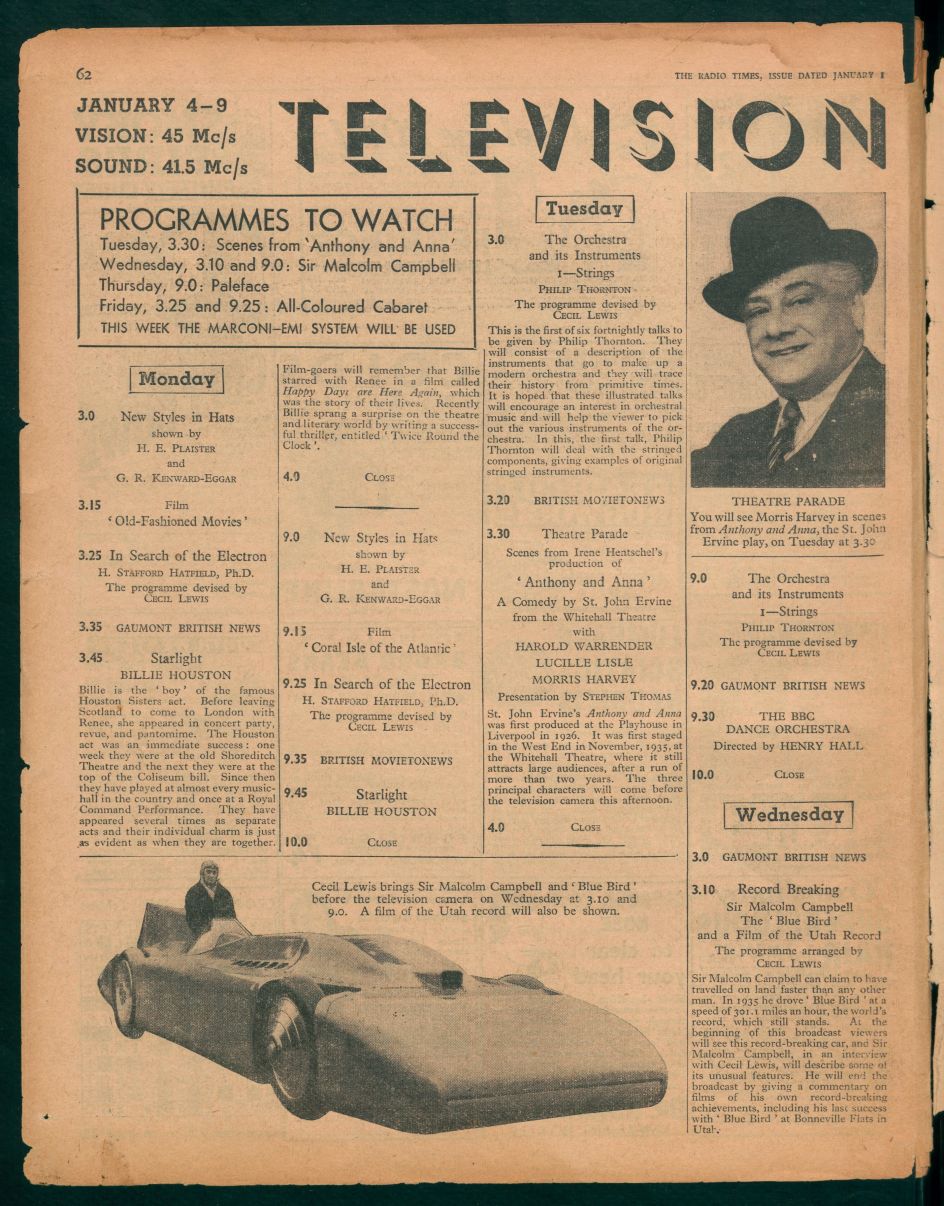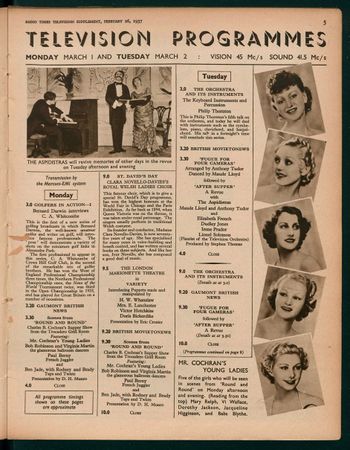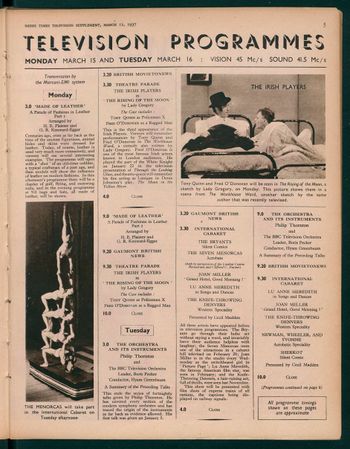The Orchestra and its Instruments (lost early BBC music talk show; 1937)
The Orchestra and its Instruments is an early music talk show. Hosted by Philip Thornton, the six-part series examined the history of the various instruments incorporated into an orchestra at the time, with the intent to encourage greater interest in orchestral music.
Background
The BBC's interest in orchestral music started when it opened its BBC Television Service on 2nd November 1936. As part of the show Variety, the BBC showcased the talents of the BBC Television Orchestra, being their first of many appearances in pre-Second World War television.[1] In an attempt to further entice viewers to take up orchestral music, programme deviser Cecil Lewis established The Orchestra and its Instruments, a six-part television series where Philip Thornton would discuss the various instruments that made up a 1930s orchestra.[2][3] According to issue 696 of Radio Times, Thornton prior to the show had appeared in several radio music broadcasts, including Musical Switchback, A Traveller in Search of Music, Song and Dance, and Food and Music.
The Episodes
The first episode of The Orchestra and its Instruments was broadcast on 5th January 1937.[2][3] It featured Thornton discussing the stringed components within orchestral instruments, including showcasing some of the original stringed instruments.[2][3] Based on each Radio Times issue, the episodes would be repeated later that same day, lasting for 20 minutes.[2][3] The second episode, given the title of Musical Instruments, was broadcast on 19th January.[4][5] Here, Thornton discussed wooden instruments, including the bassoon, oboe, clarinet, and flute. A deep dive into early flutes and those utilised across the world also transpired, including Turkey's zurba, and Bulgaria's duduk and kaval.[4][5] The third episode, which was broadcast on 1st February, looked at a set of wind instruments, including the euphonium, the tuba, the French horn, the cornet, the bugle, the trumpet, and the hunting-horn.[6][7]
Episode 4, presumably due to be broadcast on February 15th as new episodes were aired on a fortnightly basis, was not documented by issue 698 of Radio Times, which lacked a section dedicated to television airings from the 14th to the 20th of February.[8] On 2nd March, the fifth episode aired, focusing on keyboard and percussion instruments like the cimbalom, piano, clavichord and harpsichord.[9][10] The show concluded on 16th March with a summary of the preceding talks, while the BBC Television Orchestra provided a full demonstration of the music and instruments covered throughout the series.[11][12]
Availability
Like all early television transmissions, all episodes of The Orchestra and its Instruments were televised live and there were limited viable means of recording television prior to the Second World War, with recording seldom having occurred until videotape was perfected in the late-1950s.[13] Thus, all footage of the show is likely permanently missing. The Radio Times issues helped to document five of the six episodes that aired.[3][5][7][10][12]
Gallery
Images
See Also
Early BBC Television
- Alexandra Palace's wartime television demonstrations (lost footage of private television transmissions; 1943, 1945)
- An Inspector Calls (lost television adaptation of play; 1948)
- Ann and Harold (lost early BBC drama television series; 1938)
- BBC Election Night (lost coverage of British general elections; 1950-1951)
- The Care of Your Car (lost early BBC motoring show; 1947)
- Cook's Night Out (lost early BBC cooking show; 1937)
- Craftsmen at Work (lost early BBC documentary show; 1938, 1946)
- Dish of the Month (lost early BBC cooking show; 1937)
- First Aid (lost early BBC medical show; 1937)
- Foundations of Cookery (lost early BBC cooking show; 1939)
- Marcel Boulestin television shorts (lost early BBC programs; 1937-1939)
- Masks through the Ages (lost early BBC history talk show; 1937)
- Opening of the BBC Television Service (partially found coverage of inaugural day of high-definition television service; 1936)
- RCA recording of BBC Television Service (found footage of pre-Second World War BBC television broadcast; 1938)
- Sea Stories (lost early BBC talk show; 1936-1937)
- Spelling Bee (lost early BBC game show; 1938)
- Telecrime (lost early BBC crime drama; 1938-1939; 1946)
- The Wasp's Nest (lost early BBC television adaptation of Agatha Christie short story; 1937)
- Weaponless Self-Defence (lost early ju-jitsu television program; 1936-1937)
- The World of Women (lost early BBC talk show; 1937)
Early BBC Sports Television
- 1931 Epsom Derby (lost televised footage of horse racing event; 1931)
- 1937 FA Cup Final (partially found footage of football match; 1937)
- 1937 International Imperial Trophy Race (lost footage of motor race; 1937)
- 1937 Wimbledon Championships (partially found footage of tennis tournament; 1937)
- 1938 Ashes Series (partially found footage of international test cricket match; 1938)
- 1938 FA Cup Final (partially found footage of football match; 1938)
- 1939 FA Cup Final (partially found footage of football match; 1939)
- 1947 FA Cup Final (partially found footage of football match; 1947)
- 1953 British Grand Prix (partially found footage of Formula One race; 1953)
- 1955 Scottish Cup Final (partially found footage of football match; 1955)
- Archery (lost early televised toxophily; 1937-1938)
- Arsenal 7-1 Hibernian (lost footage of charity football match; 1952)
- Arsenal vs Arsenal Reserves (lost footage of early BBC televised football match; 1937)
- Barnet 3-2 Wealdstone (lost footage of Athenian League football match; 1946)
- The Boat Race 1938 (partially found footage of rowing race; 1938)
- Catch-As-Catch-Can Wrestling (lost early BBC televised professional wrestling matches; 1938-1939; 1946-1947)
- Charlton Athletic 1-0 Blackburn Rovers (lost footage of FA Cup match; 1947)
- Darts and Shove Ha'penny (lost early BBC televised darts matches; 1936-1939)
- England 0-1 Scotland (partially found international football match; 1938)
- England 1-1 Scotland (partially found footage of international football match; 1947)
- England 16-21 Scotland (partially found footage of rugby match; 1938)
- England 3-0 France (partially found footage of international football match; 1947)
- England 3-0 Rest of Europe (partially found footage of international football match; 1938)
- Falkirk 3-2 Newcastle United (lost footage of football match; 1953)
- Horace Lindrum vs Willie Smith (lost footage of televised snooker; 1937)
- Scottish Universities 1-1 English Universities (lost footage of international football match; 1952)
- Woods and Jack (lost early televised lawn bowls; 1937; 1946)
External Link
References
- ↑ BFI Screenonline detailing the BBC Television Orchestra's first appearance on television. Retrieved 26th Jan '22
- ↑ 2.0 2.1 2.2 2.3 BBC Genome archive of Radio Times issues detailing the first episode and the show's premise. Retrieved 26th Jan '22
- ↑ 3.0 3.1 3.2 3.3 3.4 Issue 692 of Radio Times listing the first episode. Retrieved 26th Jan '22
- ↑ 4.0 4.1 BBC Genome archive of Radio Times issues detailing the second episode. Retrieved 26th Jan '22
- ↑ 5.0 5.1 5.2 Issue 694 of Radio Times detailing the second episode. Retrieved 26th Jan '22
- ↑ BBC Genome archive of Radio Times issues detailing the third episode. Retrieved 26th Jan '22
- ↑ 7.0 7.1 Issue 696 of Radio Times detailing the third episode. Retrieved 26th Jan '22
- ↑ BBC Genome noting issue 698 of Radio Times lacked any section dedicated to television. Retrieved 26th Jan '22
- ↑ BBC Genome archive of Radio Times issues detailing the fifth episode. Retrieved 26th Jan '22
- ↑ 10.0 10.1 Issue 700 of Radio Times detailing the fifth episode. Retrieved 26th Jan '22
- ↑ BBC Genome archive of Radio Times issues detailing the sixth episode. Retrieved 26th Jan '22
- ↑ 12.0 12.1 Issue 702 of Radio Times detailing the sixth episode. Retrieved 26th Jan '22
- ↑ Web Archive article discussing how most early television is missing due to a lack of direct recording of television. Retrieved 26th Jan '22




